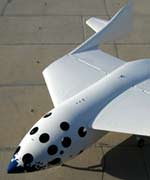
Image credit: Scaled Composites
The House of Representatives today approved legislation, sponsored by Space and Aeronautics Subcommittee Chairman Dana Rohrabacher (R-CA), designed to promote the development of the emerging commercial human space flight industry. H.R. 3752, The Commercial Space Launch Amendments Act of 2004, would put in place a clear, balanced regulatory regime to promote the industry while ensuring public safety. The legislation now heads to the U.S. Senate.
“Through our hearings and other work on the bill, I have come to see this as one of the most important measures this Committee will move this year,” stated House Science Committee Chairman Sherwood Boehlert (R-NY). “This is about a lot more than ‘joy rides’ in space, although there’s nothing wrong with such an enterprise. This is about the future of the U.S. aerospace industry. As in most areas of American enterprise, the greatest innovations in aerospace are most likely to come from small entrepreneurs. This is true whether we’re talking about launching humans or cargo. And the goal of this bill is to promote robust experimentation, to make sure that entrepreneurs and inventors have the incentives and the capabilities they need to pursue their ideas. That’s important to our nation’s future.” Boehlert’s full statement follows this release.
Rohrabacher noted, “It is my sincere hope that this bill will encourage individuals like Burt Rutan and others to continue leading the way in pushing the boundaries of technology and safety by building and flight testing hardware, something NASA has yet to do. This fine piece of legislation carries forward my goal of promoting this new industry and cutting back bureaucratic red tape, while protecting the public health and safety.”
“No one can say for certain whether commercial human space flight will become a major industry. However, I believe that the provisions in H.R.3752 will help nurture its growth while at the same ensuring that public health and safety are protected,” said Science Committee Ranking Democrat Bart Gordon (D-TN).
Major provisions of the legislation are designed to:
* eliminate any confusion about who should regulate flights of suborbital rockets carrying human beings by explicitly locating all commercial space flight authority under the Federal Aviation Administration (FAA) Office of Commercial Space Transportation (AST);
* make it easier to launch new types of reusable suborbital rockets by allowing AST to issue experimental permits that can be granted more quickly and with fewer requirements than licenses;
* extend government indemnification for the entire commercial space transportation industry (including licensed, non-experimental commercial human space launches) for a period of three years, but the bill will not grant indemnification for flights conducted under experimental permits, which will be more lightly regulated; and
* require a study on how best to gradually eliminate indemnification for the commercial space transportation industry by 2008 or as soon as possible thereafter.
Today’s House passage represents the culmination of a long and thorough process beginning last July with a joint House-Senate hearing, a Space Subcommittee hearing last fall and a policy roundtable with experts in the commercial space transportation industry late last year.
“Today, the U.S. House of Representatives has led the nation toward a significant next step in developing space and creating a major new economic engine for powering our nation’s economy. With the passage of HR 3752, the House has demonstrated real vision for America’s future in space. This bill helps define the critical framework for a commercial space regulatory process and authorizes the very important federal agency that is responsible for commercial space regulation. The leadership of both the House Subcommittee on Space and the House Committee on Science should be highly commended for their work in passing this bill,” said Tim Huddleston, Executive Director of the Aerospace States Association.
“H.R. 3752 is precisely the kind of legislation Congress should enact in order to give investors like me confidence that our space tourism ventures will be regulated in a fair and streamlined manner. I hope the Senate takes up this bill soon and sends it on to President Bush for his signature.,” stated Dennis Tito, the first space tourist in history.
Jeff Greason, President of Xcor Aerospace, a private rocket firm with goals of sending human beings into space said, “We think H.R. 3752 is very carefully crafted legislation which will help commercial human spaceflight develop in America. Confirming the FAA’s definition of suborbital flight, establishing a ‘fly at your own risk’ human spaceflight regime, and creating the new ‘experimental permit’ framework are all important steps which we fully support. We hope the bill moves through Congress swiftly retaining these key provisions.”
Original Source: House Committee on Science
